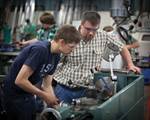The Cardinal Rule of Workforce Development
Maybe the industry needs more soft skills than technical skills.
In discussing the challenges associated with building our future workforce, it’s becoming evident that the next generation seems to have a “soft skills” deficit. Working as a team player, being flexible, communicating effectively, being resourceful and creative, handling pressure, accepting feedback and applying it, taking responsibility, managing time, and possessing a positive attitude and a solid work ethic are all considered soft skills that are necessary to work within and help run a successful business.
The biggest advocate I’ve met for pushing soft skills development is Cardinal Manufacturing founder Craig Cegielski. If you haven’t heard of Cardinal in Strum, Wisconsin, by now, you should definitely read up on it (short.moldmakingtechnology.com/cardinal). Cardinal is a high school vocational manufacturing program that operates as a commercial business, giving students a chance to gain real-life experience in running a business and having a career. Its primary focus is developing the students’ precision machining, welding and other metal working skills, while instilling in them the soft skills and professionalism that employers want.
“We believe in this type of learning because it teaches so much more than just the technical skills,” Craig says. “Everyone I talk to tells me that the most important thing is to teach soft skills and employability skills, and then the technical skills will follow.”
Cardinal’s approach is catching on. This fall, a replica program in Hurley, Wisconsin, enrolled 50 students—up from 30 the year before! Northwoods Manufacturing (northwoodsmfg.org) is student-run out of Hurley High School. Its main goal is to give students real manufacturing experience at school, teaching real-world applications and soft skills. Students participate in welding/fabricating, machining, engineering, marketing, sales, business and more.
Jacob Hostettler, the metals instructor, was a student teacher at Cardinal last year. Hurley High School officials visited Cardinal and ended up hiring Jacob to start Northwoods. The No. 1 thing Jacob learned from Craig was how to interact with the kids to get them motivated to want to work. He put his own twist on Craig’s program by creating a grading system using a “competency checklist” to evaluate each student from freshman year to graduation on math and hands-on skills. Every competency comes with an instruction sheet that explains what needs to be done to “complete” that competency. Each week, students are evaluated on worth ethic and on how many competencies they have completed or worked to complete. Students report to Jacob, and he applies a rating to each competency step to establish an overall grade for that competency.
Let’s hope this model continues to catch on and becomes the rule, not the exception. If you know of any other similar efforts, please pass them along to me at cfuges@gardnerweb.com.
Related Content
-
MMT Chats: Eliminating the Noise to Stay Focused on the Customer
Metro Mold & Design joins me to discuss the value of the 80/20 rule as a business strategy, its talented cross-functional team, the role of automation in mold building and molding, and the continuing impact of COVID-19.
-
How to Solve Hot Runner Challenges When Molding with Bioresins
A review of the considerations and adaptations required to design hot runners and implement highly productive injection molding operations.
-
How to Use Scientific Maintenance for More Accurate Mold and Part Troubleshooting
Discover how adopting scientific maintenance approaches helps improve mold lifespan, minimize failures, and optimize production outcomes.













